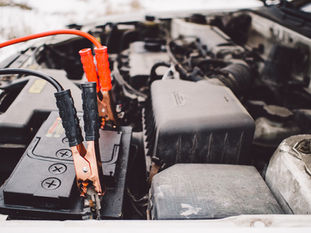
Maximizing Solar Energy Efficiency: The Role of Batteries in Off-Grid Systems
0
24
0

In recent years, solar energy has emerged as a leading solution for powering homes, businesses, and remote areas without relying on traditional power grids. While solar panels are essential for harnessing energy from the sun, the true potential of solar energy can only be realized with the integration of efficient battery storage systems. Batteries play a crucial role in off-grid solar installations by storing excess energy generated during the day and making it available for use when the sun isn’t shining.
In this blog post, we’ll explore how batteries maximize solar energy efficiency and why they are essential for off-grid systems.
The Need for Energy Storage in Off-Grid Systems
Off-grid solar installations are designed to operate independently from the main power grid, providing power to homes or businesses in remote locations. However, solar panels alone can’t provide a constant source of energy. Solar energy production fluctuates throughout the day, with peak generation occurring during sunny hours and no energy being generated at night. This presents a challenge for ensuring a consistent energy supply.
This is where battery storage comes into play. Batteries store the excess energy generated during peak sunlight hours and release it when the demand is high, such as during the evening or cloudy days. By storing surplus energy, batteries allow off-grid systems to function smoothly around the clock, even in areas where sunlight is inconsistent.
How Batteries Improve Solar Energy Efficiency
Batteries significantly enhance the efficiency of solar energy systems by ensuring that no energy goes to waste. Without a battery system, excess energy generated during the day might be lost, especially when solar panels produce more electricity than is immediately needed. By storing this surplus energy, batteries maximize the usage of every watt of solar power.
In addition, batteries enable energy independence. Homeowners and businesses with off-grid systems rely on stored energy to meet their needs, reducing dependence on backup generators or fossil fuels. This not only cuts down on operational costs but also minimizes environmental impact by using 100% renewable energy, even when the sun isn’t shining.
Types of Batteries for Off-Grid Solar Systems
There are several types of batteries available for solar storage, each offering different advantages in terms of performance, lifespan, and cost. The most commonly used batteries in off-grid solar systems include:
Lead-Acid Batteries
Lead-acid batteries are a popular choice for off-grid systems due to their affordability and reliability. They are available in two types: flooded lead-acid and sealed lead-acid (AGM or Gel). While lead-acid batteries are less expensive upfront, they typically require more maintenance and have a shorter lifespan compared to newer battery technologies.
Lithium-Ion Batteries
Lithium-ion batteries are becoming increasingly popular in solar energy systems because of their high energy density, longer lifespan, and lower maintenance requirements. Although they are more expensive upfront, their superior performance and durability make them a cost-effective solution in the long run.
Flow Batteries
Flow batteries are an emerging technology known for their long cycle life and ability to handle large amounts of energy storage. While they are still relatively expensive, flow batteries are ideal for larger-scale off-grid systems that require significant energy storage capacity.
Sizing the Battery for Your Off-Grid System
To maximize solar energy efficiency, it’s essential to choose the right battery size for your system. The size of the battery depends on factors such as the amount of energy your system produces, your daily energy consumption, and your location’s sunlight availability. A properly sized battery will ensure that you have enough stored energy to meet your needs without running out of power during cloudy days or at night.
Working with a professional installer, like Chloride Exide, can help ensure you select the correct battery size for your specific off-grid setup. They can analyze your energy needs and recommend a battery solution that maximizes efficiency while keeping costs manageable.
Benefits of Using Batteries in Off-Grid Systems
There are numerous benefits to integrating batteries into off-grid solar systems, including:
Energy Independence: Batteries allow you to store solar energy for use when needed, providing reliable power even in remote locations or during grid outages.
Cost Savings: By storing and using solar energy efficiently, you can reduce or eliminate the need for expensive backup generators or fuel.
Sustainability: Storing excess solar energy reduces reliance on fossil fuels, contributing to a cleaner, greener environment.
Reliability: Modern battery technologies are designed to provide consistent power and have long lifespans, ensuring reliable energy for years to come.
Conclusion
Batteries are the backbone of any off-grid solar system, ensuring that stored energy is available when solar panels can’t generate power. Whether you’re powering a remote home or a business, integrating the right battery storage solution can maximize your solar energy efficiency and provide a dependable, eco-friendly source of energy. As solar technology continues to advance, batteries will play an increasingly vital role in shaping the future of sustainable energy.
At Chloride Exide, we offer a wide range of batteries designed for solar energy systems, helping you achieve energy independence while minimizing environmental impact. Contact us today to learn more about the best battery solutions for your off-grid solar installation.






